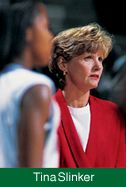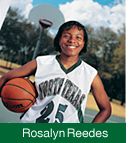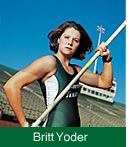 |
 |
||||||
|
|
|
|
|
But Slinker was not prepared for disrespect.“In my school, girls were swimmers or gymnasts, not basketball players,” says Slinker, head coach of the UNT women’s basketball team and director of women’s athletics. “The boys’ team was intimidated by us and didn’t want us playing at all.” Her team received little fan support. But that didn’t stop Slinker from eventually becoming a women’s basketball coach. Now in her 12th season at UNT, she has turned the Lady Eagles into a winning Division I-A team. During the 1998-99 season, the team had a 20-8 record, the finest in its history, and was undefeated at home. Slinker was named Big West Conference Coach of the Year. The 1999-2000 team opened its season with a 9-2 record — its best start ever. The Lady Eagles finished the season as co-champions of the Big West Conference Eastern Division with the University of Nevada. Instead of the disrespect that Slinker experienced in high school, the team received much media attention and fan support. “The key word in Title IX is progress, and we’re continuing to make progress,” Slinker says. “By giving women athletes exposure, Title IX has helped many sports fans gain appreciation for the teams.”
Bringing recognition Women’s athletics at UNT did not begin with Title IX. The 1906 Cotton-Tail yearbook featured women’s basketball and tennis teams. The teams began playing other women’s teams regularly in 1913 and joined the Texas Intercollegiate Athletic Association in 1921. In 1925, however, the Board of Regents for all Texas teachers’ colleges banned women’s intercollegiate athletics. In response, Beulah Harriss, a coach and member of the North Texas physical education faculty, formed the Women’s Athletic Association on campus to provide female students with a way to play intramural sports and non-sanctioned extramural sports. Today, UNT offers seven NCAA-sanctioned sports for women — basketball, golf, soccer, swimming and diving, tennis, track and cross country, and volleyball. Basketball isn’t the only women’s team that has brought recognition to UNT. The Lady Eagles soccer team had a 15-5-2 record for the 2000 season and finished second in the Big West Conference. The Lady Eagles volleyball team won a conference championship as recently as 1995. “Better players have made women’s athletics better at UNT and elsewhere,” Slinker says. “Today, women have more opportunities at younger ages, and they play all year.”
The early years of equality UNT first offered scholarships for women’s basketball, track and field, and volleyball following Title IX. Lisa Risinger Suttle (’79) received one of the first women’s basketball scholarships. She finished her UNT career as a leading scorer and is now in the UNT Athletic Hall of Fame. “I appreciated North Texas for allowing me to play because the scholarship was the only means I had for getting through college,” she says. Suttle says her team drew little attention. “Even when we traveled to places like Texas Tech, which has always had a strong women’s team, we played in a huge gym before maybe 20 fans,” she says. Things didn’t improve much during the 1980s, says Isalene Jones Welch (’85), a former forward who is a UNT Athletic Hall of Fame member. “ Usually, only family members and other athletes attended,” she says. “More came when we had doubleheaders with the guys’ team. The newspapers didn’t usually write about us.”
“The games have become more fast paced and more entertaining,” she says. Former guard Ashley Norris (’99), ranked second in three-point goals last season, agrees. “People see now that women can play just as well as men,” says Norris, who now plays for the Oklahoma Flyers, a team of former college players.
Respect for athleticism Unlike Slinker, most of UNT’s women athletes say they haven’t experienced disrespect for playing their sports. Nikki Smetzer, senior soccer forward, says soccer for both boys and girls was well supported in her hometown of Midland. “I’ve had guys say things to me that make me think they admire how I play,” she says. Shannan Stephenson, junior basketball guard, played both soccer and basketball at her high school in Winchester, Tenn. “I was taller and bigger than most of the girls,” she says. “At one time, I wished I was a cheerleader, but now I’m glad I wasn’t.” Daniella Grimaldo, senior volleyball setter, says her team at Klein High School in Spring “was looked upon as a good thing by the guys in general.”
“Even if I wasn’t respected, I wouldn’t have quit athletics for anything,” she says. “Some guys like it that you’re an athlete because you carry yourself with confidence.”
Academics and athletics That confidence carries over into the classroom. UNT’s female athletes had an average cumulative GPA of 3.02 at the end of the spring semester. Some have received academic honors. Norris posted a 4.0 GPA for Fall 1999 and was named to the GTE Academic All-District VI University Division Women’s Basketball Team. She began her master’s degree during her last season with the Lady Eagles.
“I don’t think anyone can characterize me as a dumb jock,” says volleyball player Laura Gomez (’00), a master’s student in kinesiology. All UNT athletes receive academic assistance through RAPTOR, a program in the athletics department that includes two leadership development courses and required study halls. The program also provides tutors. Still, UNT’s female athletes say they must plan study time carefully to fit in with their training schedules. Preseason training for volleyball, soccer and basketball players includes runs and weight sessions at 6 a.m. and practice twice a day. Practice is once a day after the season starts but lasts all afternoon. Tennis, golf and track team members, whose seasons last all year, are on the court, course or track from 1:30 to 6 p.m. Track team member Rhatisha Scott, a sophomore marketing major, says, “Professors don’t give us special privileges because we are athletes. I’ve had to work just as hard as everybody else.” Senior Christy Johnson, soccer midfielder, says the team usually returns from road games Sunday evenings, but “sometimes we have flight delays and don’t come back until 7 a.m. Monday.” “We still have to be in our 8 a.m. classes,” says Johnson, a general studies major. Sophomore golfer Melissa Mason regularly takes her homework with her to tournaments. “I have even e-mailed my professor a paper from a hotel,” she says. “It’s really difficult sometimes because you get home from practice and you’re exhausted, but you have to be adamant about studying right away,” says senior tennis player Melissa Hodges.
Lessons learned UNT’s female athletes say their sports have also taught them to excel in other ways. Suttle uses the time management and goal setting skills she learned in basketball in her job as coordinator of student services for the Canyon Independent School District. “I’m a firm believer in the discipline that you learn in athletics,” she says. Gomez says volleyball provides social skills as well. “We’re role models. I’ve been all over the United States and met a lot of people,” she says. “I’m planning to coach, so seeing how other teams interact has benefited me.” Stephenson says the best thing about athletics is teamwork. “It’s the
best feeling to work together and win at the buzzer,” she says.
“I’m always going to be involved in athletics. As long as my knees
hold up, I will play.”.
|
||||||||

 AFTER
YEARS OF PLAYING BASKETBALL WITH HER FAMILY, Tina Slinker was pleased
when her high school in Portales, N.M., began a girls’ team to comply
with Title IX law. The law, requiring opportunities for female athletes
in proportion to male athletes in federally assisted education programs,
was passed in 1972.
AFTER
YEARS OF PLAYING BASKETBALL WITH HER FAMILY, Tina Slinker was pleased
when her high school in Portales, N.M., began a girls’ team to comply
with Title IX law. The law, requiring opportunities for female athletes
in proportion to male athletes in federally assisted education programs,
was passed in 1972.  Junior
basketball guard Rosalyn Reades, Big West Conference leader in steals
last year, says the success of U.S. women’s basketball and softball
teams at the 1996 Summer Olympics and the rise of the Women’s National
Basketball Association and the U.S. Women’s soccer team were turning
points for women’s athletics.
Junior
basketball guard Rosalyn Reades, Big West Conference leader in steals
last year, says the success of U.S. women’s basketball and softball
teams at the 1996 Summer Olympics and the rise of the Women’s National
Basketball Association and the U.S. Women’s soccer team were turning
points for women’s athletics.  Sophomore
Britt Yoder is a pole vaulter on the track team — an event that
debuted for women at this year’s Summer Olympics in Australia. She
was voted “Most Athletic” by her classmates at Fort Worth’s Boswell
High School.
Sophomore
Britt Yoder is a pole vaulter on the track team — an event that
debuted for women at this year’s Summer Olympics in Australia. She
was voted “Most Athletic” by her classmates at Fort Worth’s Boswell
High School.  Several
current players are also in graduate school.
Several
current players are also in graduate school.